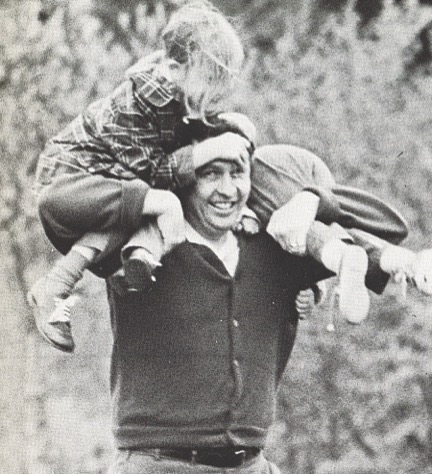 Norval William Rindfleisch P’73, P’77, P’81, P’84
Norval William Rindfleisch P’73, P’77, P’81, P’84
1934-2020
Lewis Perry Professor in the Humanities and Instructor in English, Emeritus (1930-2015)
Norval Rindfleisch was described as highly intelligent, well-educated, impatient, ambitious, candid, good with people, interesting, full of wit and humor, opinionated, loyal, and self- reliant. A boarding school instructor of English for forty two years, Norval taught with purpose; he believed, “We must enter each class with an enthusiastic commitment to the usefulness of the hour, a concern for our students, and a love of what we teach.”
Born on April 2, 1930, in Los Angeles, CA, to Adolph and Lillian Nolan Rindfleisch, Norval William Rindfleisch was raised primarily in South St. Paul, Minnesota, where he attended Cretin High School and started college at the University of Minnesota. After serving in the
U.S. Coast Guard from 1950 -1953, Norval married his beloved wife Carol Olsen in 1954 and returned to his studies -- first at Long Beach City College and then at the University of Chicago where he earned a B.A. in 1957 and an M.A. in 1958; a member of Phi Beta Kappa in 1957, Norval was also named a Woodrow Wilson National Fellow. From 1958 to 1968, he taught at Pomfret School where he chaired the English Department, coached Varsity Football, and lived in the dorm.
Colleagues and friends would later note that a portrait of Norval would be incomplete without saying– as one department member wrote – “His one frivolity, and it was an intense one, was golf.” In fact, Norval first met future English colleagues Charlie Pratt and Dick Niebling when playing golf – and thus considered teaching at Exeter.
Joining the faculty in 1968, Norval taught English with a particular focus on writing. Upon his retirement in 1990, Principal Kendra Stearns O’Donnell wrote, “In his long career … Norv proved himself to be a master of both the theory and practice of the teaching of writing; his interest and expertise have shaped this critical element of an Exeter education.” A former student recalled that “his skill as a writer was inspiring -- his grace, wit and reverence for the writer's craft was the … most important thing that made me a writer. He singlehandedly changed the trajectory of my life.” No doubt part of that inspiration came from Norval’s directive: “We must celebrate each day the concrete word, the sacred whatness of revealing detail, the glory of the simple sentence.”
Beyond the Exeter classroom Norval coached football, and worked on numerous committees including Appointments, Educational Policy, Dormitory, Faculty Workload, Lamont Poets, Interdisciplinary Writing, Advanced Placement, Athletic Workload, Bennett Fellow, and Graduate Student Procedures; on the latter four committees, Norval served as chair. Between 1970 and 1996, Norval also shared his knowledge of literature and secondary school teaching by giving over twenty papers, presentations, and workshops to schools and community organizations.
Norval lived in Webster Hall and Dow House, before serving as dorm head in Wentworth Hall and then Williams House. During those years Norval and Carol’s four children all attended the Academy: Mary Frances ’73, Julie Ann ’77, Katherine Nolan ’81, and Joseph Karlstad ’84. The family spent the 1977-78 school year in Rennes, France where Norval taught at SYA. In 1984 Norval served as the Resident Director of the Washington Intern Program. In 1986-87 he took another year away from Exeter to teach at Episcopal High School in Virginia, where he won the “Best Teacher Award.”
The Academy and others also recognized Norval’s work in several ways. Appointed Louis Perry Professor in the Humanities in 1981, Norval was then chosen as one of the first recipients of the Brown Family Faculty Award in 1985. In 1986 the University of Chicago awarded him a citation for excellence in teaching, echoing the Scholastic Magazine/Smith Corona Award of 1980 – one given to three teachers nationally.
In 1989, as he planned his retirement, Norval wrote to Dean of Faculty: “It is time to move along and spend the rest of my life working at my first passion – writing – or rather re- writing as is more often the case with me.” Starting in 1964, during all those years of teaching, Norval published fiction, with short stories appearing in many journals and anthologies; the story “Cliffs of Fall” won an O. Henry Award in 1970. Norval’s first book In Loveless Clarity and Other Stories was followed by four more in 1980, 1995, 2000, and 2001. Norval also continued to share his love of words and writing with students in states ranging from Louisiana to South Dakota.
In celebration of the Academy’s bicentennial in 1991, Norval was asked to write a curriculum statement which became the essay, “Seminar Teaching and the English Curriculum.” In this piece, later re-published by Independent School, Norval explained the power of Harkness teaching and personal writing. At the close of the essay, he quoted Dostoevsky: “Have faith in the self-correcting powers of the human soul.” With that line Norval reminded teachers that “we must allow the process of self-correction to take place” both at the table and on paper. He concluded, “if we do, our students may then realize a self-sustaining grace of style and intellect to go their own ways.”
Norval Rindfleisch died at age 84, on January 5, 2015, in New Milford, CT. He was survived by his children Mary of Sherman, CT; Julie of Sussex, NJ; Kate of Drexel Hill, PA; and Joe, of Cambridge, MA, as well as grandchildren Nora, Jane and Peter Granville and Hannah and Sarah McGrath, brothers Nolan and Greg and their wives, and numerous cousins.
Respectfully submitted,
M. Rebecca Moore
Brooks Moriarty
April 15, 2024